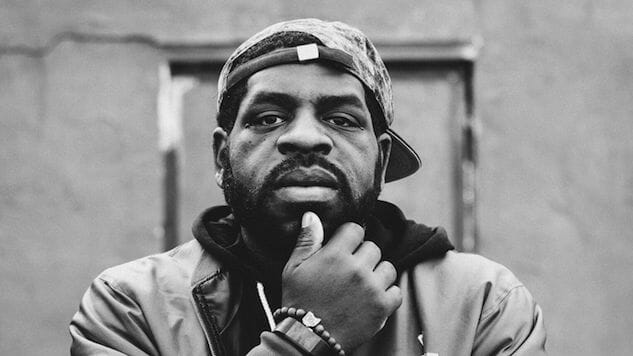One Author’s Heartwarming Journey with A Tribe Called Quest
Music critic and poet Hanif Abdurraqib discusses his new book, Go Ahead in the Rain: Notes to A Tribe Called Quest
Photo by Andrew Cenci
Hanif Abdurraqib’s relationship with A Tribe Called Quest is one that avid music fans will recognize in an instant. Apart from his credentials as a bona fide Tribe fan, Abdurraqib is an accomplished author, poet and music critic. His criticism has been published by the New York Times, MTV News and other outlets, and his recent long-form published works include a poetry collection, The Crown Ain’t Worth Much, and an essay collection They Can’t Kill Us Until They Kill Us (which made Paste’s list of 20 Best Nonfiction Books of 2017).
Instead of writing a traditional music biography or memoir, the Columbus, Ohio native decided to take readers through a unique journey that blurs the line between fandom and criticism. Abdurraqib loves A Tribe Called Quest in such a holistic and whole-hearted manner—he grew up with Tribe and associates important moments of his life with the legendary group’s music. His new book and New York Times best-seller, Go Ahead in the Rain: Notes to A Tribe Called Quest, is a poetic salute to what Abdurraqib considers to be the greatest rap group of all-time.
His ruminative approach to writing is inspiring, and he weaves narratives together like a master artisan. From the American slave codes and Leonard Cohen to the New York Knicks and the Grammys’ relationship to hip-hop, Abdurraqib not only lays a foundation for how A Tribe Called Quest came to be—he also emphasizes a world where nothing is ever in a vacuum.
“A lot of my interest and curiosity are overlapping or adjacent,” explains Abdurraqib in a phone interview. “I have to write with the trust that the people reading will follow me.”
Abdurraqib grew up in a family that loved music. His parents loved jazz music and he even tried his hand at trumpet, before realizing it wasn’t for him and having to reluctantly inform his father. But he found a connection with his parents in Tribe. “This was the jazz I had been looking for,” writes Abdurraqib, “When I put my trumpet into its case for the last time and tucked it into a closet somewhere, I played The Low End Theory for months on end, wondering if I’d ever stop.”
Abdurraqib talks about the need for a crew and the way Tribe had become another necessary crew he joined at a formative time in his life. He writes of the connective tissue between his own circle of friends and Tribe, “Like Phife Dawg, we were small and of dark skin, and we knew that our wit could be weaponized in tense moments.”
While it’s now considered very on trend for rap and hip-hop artists to position themselves as members of an alternative crowd of misfits, Tribe were one of the first groups to occupy that space. “Tribe was able to create a wide enough lane for outsiders in rap music to follow and now there are enough outsiders or ‘weird’ rappers who are actually very popular,” says Abdurraqib. “In that way, I don’t know if the aesthetics of being an outsider can be commodified, but if they can, that’s kind of happened. Now even the people who imagine themselves as outsiders are very much on the inside.”
One of Tribe’s first music videos, “I Left My Wallet in El Segundo” sees the group pile in a blue Cadillac for a ride through the desert before they stop at a gas station for a bite to eat. Q-Tip gets distracted by an attractive server at the diner, causing him to lose his wallet. Abdurraqib has an eerily similar story. He left his wallet at a gas station while driving through a Texas desert and after retrieving it, he gunned it out of there before anyone from that small conservative town became too suspicious of a guy who looked different from the typical townsfolk. After flooring it out of the gas station, Abdurraqib chuckled, realizing there was a Tribe song for this. But Abdurraqib has connections with Tribe that run even deeper.